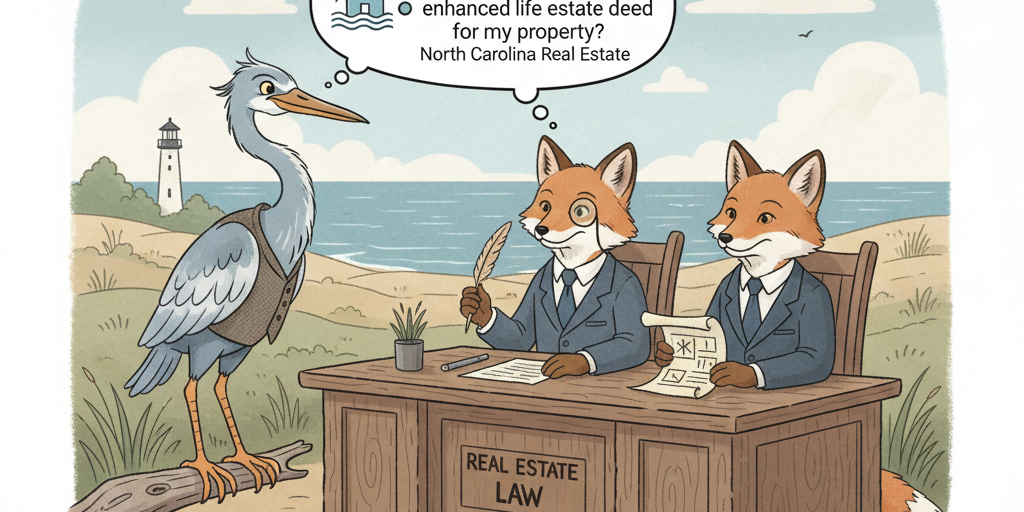How can I create an enhanced life estate deed for my property? – North Carolina
Short Answer
In North Carolina, you create an enhanced life estate deed (often called a “lady bird deed”) by signing and recording a custom deed that gives you a life estate with broad powers and names remainder beneficiaries to take the property at your death. The deed must be properly drafted, acknowledged before a notary, and recorded with the county Register of Deeds to be effective against third parties. Most owners use an attorney to ensure the deed language and recording details are correct.
Understanding the Problem
You want to keep full control of your North Carolina real estate during your lifetime and have it pass directly to named beneficiaries at your death, without probate. You own coastal property in North Carolina and want step-by-step guidance to prepare and record an enhanced life estate deed and connect with a local attorney who handles these deeds.
Apply the Law
Under North Carolina law, a deed controls ownership of real estate when it is properly executed and recorded. An enhanced life estate deed lets the owner (the life tenant) retain broad rights during life—typically including the power to sell, mortgage, lease, or revoke—while naming “remaindermen” who receive the property automatically at the life tenant’s death. North Carolina is a race recording state, so priority against purchasers and lien creditors arises only upon recording in the county Register of Deeds where the land lies.
Key Requirements
- Clear grant and reservation: The deed must convey a remainder to your chosen beneficiaries and reserve to you a life estate with explicit “enhanced” powers (to sell, mortgage, lease, or revoke without consent of the remaindermen).
- Accurate legal description: Include the full legal description for the exact tract(s), especially important for coastal parcels with easements or riparian features.
- Proper execution and acknowledgment: You must sign and have your signature acknowledged before a notary so the deed can be recorded.
- Formatting and indexing: Meet Register of Deeds recording standards (including required margins and indexing information) and include any required “Prepared by” line.
- Recording and taxes: Record the original deed with the county Register of Deeds where the property sits and pay any applicable excise tax or recording fees.
What the Statutes Say
- North Carolina Gen. Stat. § 47-18 (Recording; effect of registration) – A deed is effective against purchasers and lien creditors only from the time it is registered.
- North Carolina Gen. Stat. § 161-14 (Register of Deeds recording standards) – Sets formatting and indexing standards for documents accepted for recording.
Analysis
Apply the Rule to the Facts: Because your property is in a North Carolina coastal county, the deed must precisely describe the parcel, including any recorded easements. You will sign an enhanced life estate deed that names your beneficiaries as remaindermen and reserves to you the right to sell, mortgage, or revoke during life. Once notarized, recording it with the coastal county Register of Deeds gives your deed priority against later purchasers or lien creditors.
Process & Timing
- Who files: The property owner. Where: The Register of Deeds in the North Carolina county where the property is located. What: A custom “Enhanced Life Estate Deed” (lady bird deed) with a full legal description, “Prepared by” line, and notary acknowledgment; pay recording and any excise tax. When: Record as soon as the deed is signed and notarized to secure priority.
- The Register of Deeds reviews formatting and indexing; recording times vary by county. E-recording is available in many counties and can post the same day; walk-in or mail recording typically posts within a few business days.
- After recording, you receive a book/page or instrument number. Keep a copy with your records and provide one to your beneficiaries and any advisors.
Exceptions & Pitfalls
- Lender issues: If your property is mortgaged, review your loan documents. Some lenders have due-on-sale clauses; get written confirmation before recording.
- Missing “enhanced” powers: If the deed does not clearly reserve your right to sell, mortgage, or revoke without consent, you may unintentionally limit your control.
- POA signing risks: Avoid having an agent sign this deed to benefit themselves unless the power of attorney expressly authorizes it and it is in your best interest; these transactions often lead to disputes.
- Recording defects: Incorrect legal descriptions, missing notary acknowledgments, or failure to meet recording standards (such as required margins) can cause rejection or cloud title.
- Public benefits and estate claims: This deed can affect Medicaid planning and creditor reach differently than a will. Rules change, so coordinate with counsel before recording.
Conclusion
To create a North Carolina enhanced life estate deed, draft a deed that conveys a remainder to your chosen beneficiaries while reserving to you a life estate with the power to sell, mortgage, lease, or revoke. Sign before a notary and record the deed with the county Register of Deeds where the property sits. Record promptly to secure priority against purchasers and lien creditors. Your next step: have a North Carolina real estate attorney draft and record the deed for the coastal parcel.
Talk to a Real Estate Attorney
If you’re planning a lady bird deed to keep control now and transfer your North Carolina property outside probate later, our firm has experienced attorneys who can help you understand your options and timelines. Call us today at [919-341-7055].
Disclaimer: This article provides general information about North Carolina law based on the single question stated above. It is not legal advice for your specific situation and does not create an attorney-client relationship. Laws, procedures, and local practice can change and may vary by county. If you have a deadline, act promptly and speak with a licensed North Carolina attorney.


